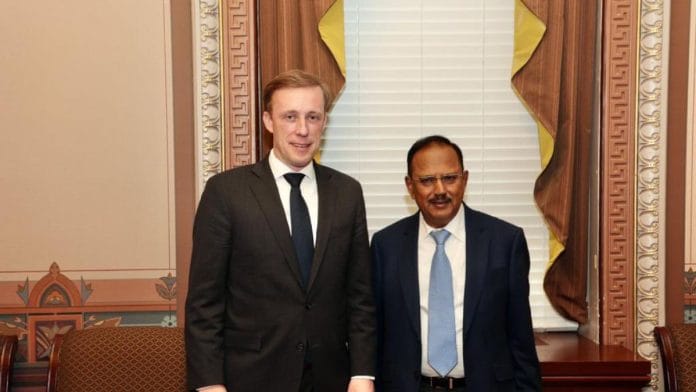New Delhi: A key focus area of the India-US Initiative on Critical and Emerging Technologies (iCET) is to remove “barriers” to collaboration on both sides and maximise the full potential of bilateral relationship, including on defence corporation, said US National Security Advisor (NSA) Jake Sullivan in New Delhi Tuesday.
Speaking at a business event organised by the Confederation of Indian Industry (CII), Sullivan said Washington and New Delhi are “poised” to lead in clean energy transformation, diversify global semiconductor supply chains and also those in other critical goods and “lead the revolution” in artificial intelligence (AI), advanced computing, biotech and quantum.
Sullivan, who is on a two-day visit to India, met his Indian counterpart Ajit Doval on 13 June when the two held the second round of iCET talks. The first dialogue was held in January in Washington DC.
Also present at the CII event was US Ambassador Eric Garcetti, who referred to Doval as an “international treasure”.
Garcetti stressed on the need to translate the vision of iCET into “human terms” and use technology to build on the strong people-to-people ties between India and the US.
Sullivan’s visit comes ahead of Prime Minister Narendra Modi’s much-anticipated visit to the US.
Last week, Foreign Secretary Vinay Kwatra travelled to the US for the strategic trade dialogue, during which both sides agreed to share best practices with regard to export control regimes, and on other issues.
‘Positive momentum under defence, space pillars’
Speaking at the CII event Wednesday, Doval said India and the US continue to have in-depth discussions on biotech, semiconductors and AI under iCET. “There is positive momentum under the defence and space pillars,” he said.
He also expressed optimism that more specific and tangible results would be achieved in the near future.
Under the iCET, India and the US have so far kick-started a Quantum Coordination Mechanism, signed an MoU on semiconductors and were engaging with various stakeholders to further collaboration in Open RAN, 5G, 6G and other critical tech.
Meanwhile, Sullivan said the iCET had the potential for building trust and confidence between the two societies and governments and deepening defence cooperation.
The iCET was launched by PM Modi and US President Joe Biden on the sidelines of the Quad Summit in Tokyo last May.
Also read: General Electric jet deal will be a test of India-US trust. Critical tech at stake






